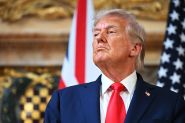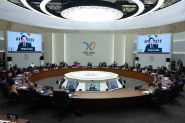- Home
- Middle East
- China Watches as Washington Gets Entangled in the Middle East

China’s success in mediating a political solution for bridging the divide between Iran and the Kingdom of Saudi Arabia was perceived by some as a ‘historic’ move. They viewed this achievement as a significant shift in Chinese foreign policy towards the Middle East, given that the influential Asian nation, with its veto power as one of the five permanent members of the United Nations Security Council, holds sway over the region and its future paths.
Within the framework of the delicate balance imposed by the Cold War among the global powers, China aligned itself with the Soviet Union against the Western bloc. However, during the 1970s, gradual transformations took root in China, especially in its relations with the West following the historic visit of US President Richard Nixon in February 1972. Beijing started leaning towards pragmatism in the economic sphere, aiming for revitalization and growth.
China prioritized economic development and the bolstering of its military power over involvement in significant international or regional conflicts. It believed that strategic and gradual economic expansion could effectively extend its influence across continents, rather than opting for direct military engagement similar to the actions of the United States in Iraq, Afghanistan, Vietnam, and various other geographic locations. China has invested hundreds of billions of dollars in Africa, launching the Belt and Road Initiative and extending its economic influence on many countries through the signing of strategic cooperation agreements, signed with both Riyadh and Tehran alike.
Nevertheless, despite China's longstanding support for the Palestinian cause, its reaction to the events of October 7th and the subsequent destructive Israeli offensive in Gaza revealed a ‘more balanced position.’ While refraining from directly criticizing Hamas, China alluded in one of its statements to “the right of states to self-defense," bearing in mind China’s conventional opposition to Washington's political stance. Such careful ‘consideration’ or ‘balance’ cannot be perceived as outstanding.
Some viewpoints suggest that Washington's involvement in volatile areas worldwide, including the Middle East, provides the US with additional time to consolidate its presence and influence in the Pacific and Indian Ocean regions. This involvement also delays addressing crucial issues such as the highly contentious Taiwan file as well as issues about trade and international economic competition.
Given the close and strategic relationship between the United States and Israel, Washington remains engaged in the unfolding events in the Middle East, which has long been one of its key spheres of dominance and influence globally. This dynamic may well serve China's interests: the more Washington gets ‘embroiled’ in hotspots such as Ukraine and Gaza, the more China stands to benefit.
The Israelis are surely displeased with the 'somewhat balanced’ Chinese position, perceived as being ‘overdue’ compared to other international positions, especially those expressed by leaders who rushed to Israel in the first week of the war, offering Tel Aviv unwavering and unconditional backing for its offensive on Gaza, all under the slogan of "self-defense."
Furthermore, Israel perceives China's steadfast focus on the right of Palestinian refugees to return to their homeland as conflicting with its expansionist agenda and policies. Moreover, Israel alleges that China not only refrains from condemning Hamas but also sympathizes with it and has hindered its condemnation in the Security Council through an agreement with Russia. Additionally, China has spearheaded discussions in the Security Council aimed at censuring Israel. During a Security Council session in late November, Chinese Foreign Minister Wang Yi characterized the actions of the Israeli military as "collective punishment" and the relocation of Palestinian civilians within Gaza as "forced displacement."
In light of these developments, it is essential to closely analyze China's stance on the unfolding events in the Middle East, as well as its broader international position. China’s silence at times carries significant meanings and implications.
Read more




Comments